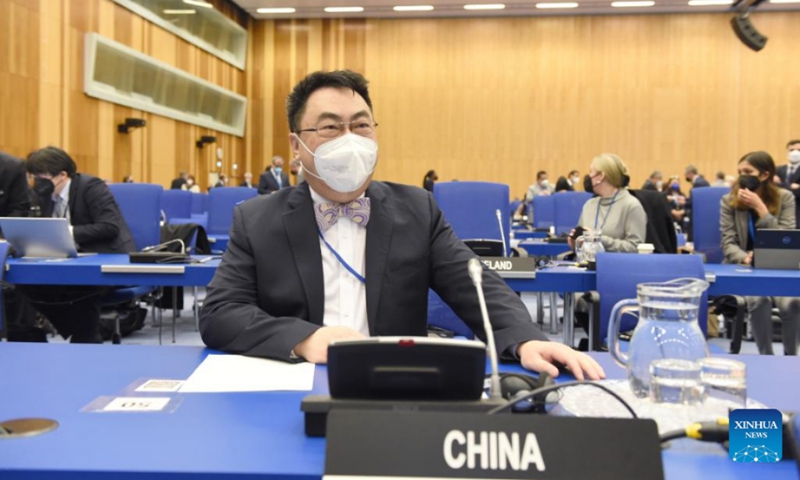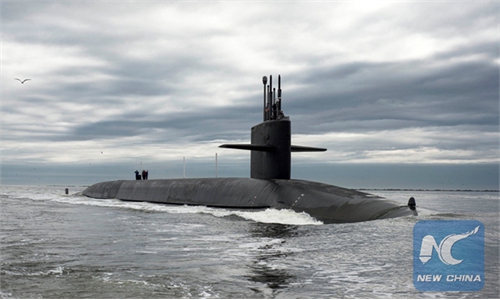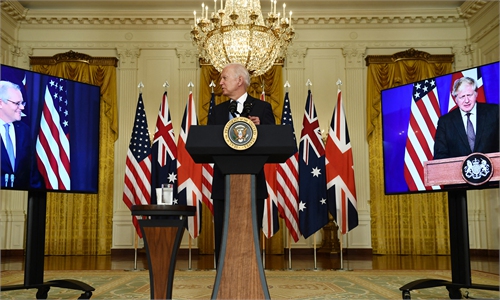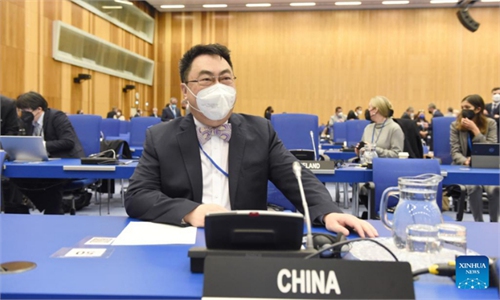Chinese envoy reiterates intl communities’ deep concerns over nuclear-powered submarine cooperation under AUKUS

China's Permanent Representative to the United Nations in Vienna Wang Qun attends a meeting convened by the International Atomic Energy Agency (IAEA) Board of Governors to discuss the situation in Ukraine, at Vienna, Austria, March 2, 2022. Wang expressed concerns for the safety of nuclear facilities in Ukraine.(Photo: Xinhua)
China's Permanent Representative to the United Nations in Vienna, Wang Qun, reiterated most of the International Atomic Energy Agency (IAEA) member states' deep concerns over the seven problems regarding the nuclear-powered submarine cooperation under AUKUS, the trilateral pact between the US, the UK and Australia on Thursday and noted that if the IAEA Secretariat is ultimately used as a "Trojan horse" by the US, UK and Australia, the international communities' interests will be undermined.
The nuclear-powered submarine cooperation under AUKUS involves the illegal transfer of nuclear-weapon materials and is an act of naked nuclear proliferation, Wang said. But for a long time, the three countries have been evading the essence of their nuclear proliferation practices, confusing right and wrong and misleading the international community, he said.
Wang made the remarks during an interview after a formal agenda of the IAEA Board of Governors decided by consensus on the nuclear-powered submarine cooperation under AUKUS at China's proposal.
The three countries used so-called naval power reactors as an excuse to avoid the "original sin" of the three countries' cooperation involving the illegal transfer of nuclear-weapon materials, which essentially amounts to nuclear proliferation, Wang said.
The three countries confuse military activities and nuclear proliferation within the sovereignty of one country. Nuclear-powered submarine cooperation under AUKUS is not simply a question of nuclear materials involved in the independent development of military vessels by sovereign states, but the first time in history that tons of nuclear-weapon grade materials have been illegally transferred by nuclear-weapon states to non-nuclear-weapon states openly and directly, which cannot be confused, Wang said.
The US and the UK have applied double standards on nuclear proliferation issues, as they imposed unilateral sanctions on civilian nuclear programs of some non-nuclear weapon states, while at the same time blatantly transferring nuclear-weapon materials to Australia.
Bloomberg reported on Thursday that China has pointed out the US double standards over the stalled Iran nuclear deal. "Western nations expect Iran to limit its nuclear-fuel stockpiles in order to revive a 2015 pact and remove sweeping economic sanctions… Meanwhile, the US and UK plan to transfer hundreds of kilograms of highly-enriched uranium to Australia as part of an agreement to sell nuclear submarines," reported Bloomberg citing Wang.
"Iran's nuclear deal with world powers collapsed four years ago after the Trump administration withdrew the US, prompting Iran to retaliate by ramping up atomic-fuel production," Bloomberg reported.
The report also cited Wang claiming that US domestic politics - November's midterm elections are another complicating factor. If the deal isn't signed within days, it will probably have to wait until after the polls, according to the report.
If the three countries were allowed to "pretend" to declare their nuclear-powered submarine cooperation to IAEA and kidnap the Secretariat using this "Trojan horse" to "whitewash" their nuclear proliferation activities and exempt the nuclear-powered submarine cooperation, it would seriously undermine the common interests of the international community including the Secretariat and all the member states, Wang said.
In September 2021, the US, the UK and Australia announced the establishment of AUKUS, under which the US and the UK will assist Australia in acquiring nuclear-powered submarines.
The so-called statement claiming that nuclear materials are sealed in a reactor, which can't be used directly for nuclear weapons, misleads public opinion and completely is unworkable. In fact, the problem is proliferation, not the disposition of related nuclear-weapon materials. Given the nature of the nuclear proliferation, cooperation among the three countries can't reduce the risks of nuclear safety, security and proliferation, Wang pointed out.
Australia, in particular, has violated the reporting obligations under the comprehensive safeguards agreement and related protocols. It hasn't submitted any substantive report to the agency as required, in violation of its legal safeguards obligations since its announcement of the nuclear-powered submarine cooperation under AUKUS, according to Wang.
The nuclear-powered submarine cooperation under AUKUS sets a bad precedent for nuclear proliferation, which goes beyond the existing safeguards system and must be discussed by all member states of the agency as all member states of the agency must have the final say, Wang said.
The three countries attempted to coerce the secretariat into offering a safeguards program that would exempt them from the nuclear-powered submarine cooperation, thereby legitimizing their illegal nuclear proliferation practices by using their majority in the council to force the council to adopt it, Wang said. They have consistently refused to report to the agency on the substantial progress of the nuclear-powered submarine cooperation on the grounds of"undetermined cooperation plans," preventing the director-general and the secretariat from providing substantive reports, Wang noted.
Global Times



